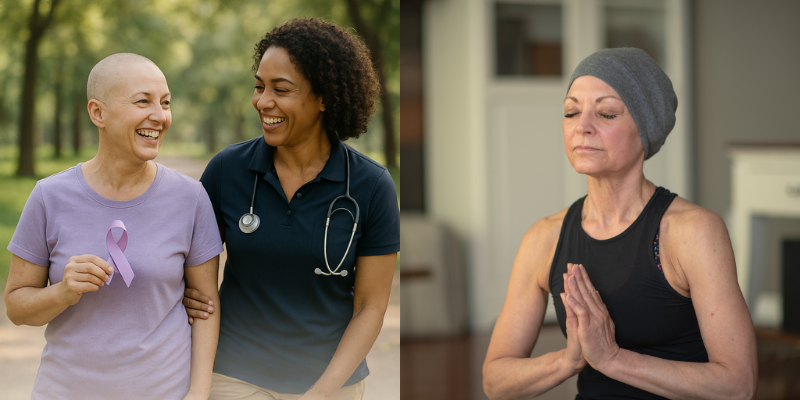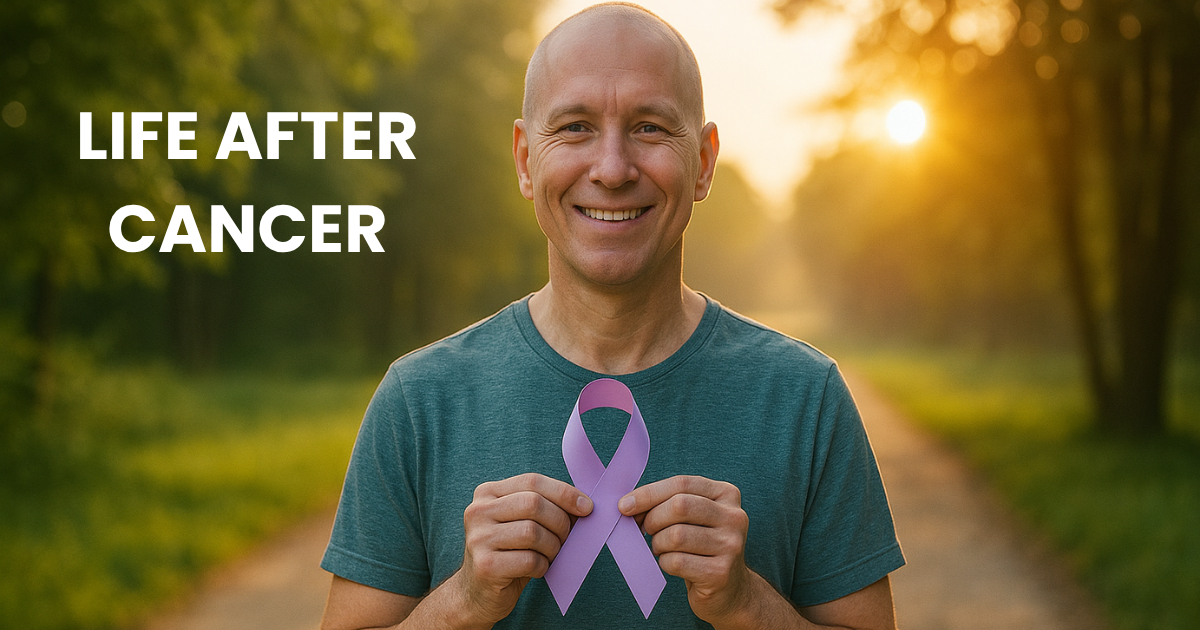Completing cancer treatment is a monumental milestone. Yet, for millions, the journey doesn’t end there. Instead, it marks the beginning of a new, often complex chapter: life after cancer. With medical advancements, the number of cancer survivors is growing significantly. As of January 2025, the United States is home to an estimated 18.6 million cancer survivors, a figure projected to surpass 22 million by 2035, according to the American Cancer Society.
The term “survivor” itself is broad, encompassing anyone from the point of diagnosis through the remainder of their life. This period, often called the “new normal,” is not about returning to the person you were before, but about discovering who you are now. It’s a time filled with a unique mix of relief, uncertainty, and adjustment. This article explores the multifaceted realities of life after cancer, debunks pervasive myths, and offers strategies and resources to help you navigate this path with resilience and hope.

Table of Contents
The Unseen Landscape: Challenges in Life After Cancer
While the end of treatment is a cause for celebration, it can also unveil a host of lingering challenges that affect survivors physically, emotionally, and financially. Understanding these potential hurdles is the first step toward managing them effectively.
Physical Aftershocks
The body endures immense stress during cancer treatment, and the effects can persist long after the final session. Many survivors grapple with long-term and late effects, which can emerge months or even years later.
- Cancer-Related Fatigue (CRF): Described as a persistent sense of exhaustion not relieved by rest, CRF is the most common long-term side effect and can significantly impact daily life for years, as noted by the American Cancer Society.
- Chronic Pain: Nerve damage, scar tissue, or other treatment-related changes can lead to ongoing pain.
- Cognitive Changes: Often called “chemo brain,” survivors may experience difficulties with memory, focus, and concentration. One study found that cancer survivors had a 38% increased odds of reporting concentration problems compared to those without a history of cancer .
- Other Physical Issues: These can include sexual dysfunction, changes in body image, bowel or bladder problems, and an increased risk of developing second cancers.
The Emotional Roller Coaster
The psychological impact of a cancer diagnosis and treatment is profound. The period of life after cancer is often an emotional roller coaster, marked by conflicting feelings of gratitude, anxiety, and sadness.
- Fear of Recurrence: Perhaps the most common emotional challenge, the fear that cancer will return can be a significant source of distress. This anxiety, sometimes dubbed “scanxiety,” can be triggered by follow-up appointments, anniversaries, or new aches and pains .
- Anxiety and Depression: While rates vary, studies show that cancer survivors are at a higher risk for developing anxiety and depression compared to the general population. Research indicates that while severe psychiatric disorders are uncommon, adjustment disorders with anxious or depressed moods are a likely consequence.
- Identity and Self-Concept: A cancer journey can fundamentally alter one’s self-perception, leading to a deteriorated self-concept or a disturbed body image. However, for some, it can also lead to positive psychological growth and a re-evaluation of life’s priorities .
Financial and Social Hurdles
The consequences of cancer extend beyond health. The “financial toxicity” of treatment—mounting medical bills, lost wages, and reduced productivity—can create lasting economic burdens. In the U.S., approximately 60% of working-age cancer survivors report some form of financial hardship . Survivors may also face difficulties with insurance coverage and employment, as well as shifts in social relationships as they navigate their new reality.
Debunking the Myths of Survivorship
Misconceptions about life after cancer can create confusion and isolation for survivors. Let’s separate fact from fiction.
Myth 1: The battle is over once treatment ends.
Fact: The end of treatment is not an endpoint but a transition. Life after cancer is a distinct phase with its own set of physical and emotional adjustments. As the National Cancer Institute explains, it’s less about “getting back to normal” and more about finding a “new normal.”
Myth 2: You’re completely cancer-free and healthy now.
Fact: Survivorship is an ongoing process that often involves continued medical surveillance, management of long-term side effects, and monitoring for recurrence. Even a procedure like a mastectomy drastically reduces but does not eliminate the chance of recurrence .
Myth 3: Cancer is a death sentence.
Fact: Thanks to decades of research and improved treatments, cancer mortality rates have been decreasing. Many cancers are now viewed and managed as chronic diseases rather than terminal illnesses, allowing for an increasing number of people to live long, fulfilling lives after diagnosis .
“Regular screenings and early detection play a huge role in improving survival rates. Learn more about the early signs of breast cancer to stay informed.”
Myth 4: Surgery or a biopsy can cause cancer to spread.
Fact: The risk of surgery causing cancer to spread is extremely low. Surgeons follow strict, standardized procedures, such as using different tools for different areas, to prevent this from happening .
Building Resilience: Coping Strategies for Your New Normal
Navigating life after cancer requires a proactive approach to self-care. Developing coping strategies can empower you to manage challenges and improve your quality of life.
Prioritizing Mental and Emotional Well-being
Your emotional health is just as important as your physical health. Finding constructive ways to process your experience is vital.
- Seek Professional Support: One-on-one counseling with a therapist experienced in oncology can provide a safe space to explore your feelings. Psychosocial support services can help you learn coping mechanisms for anxiety, body image concerns, and fear of recurrence.
- Join a Support Group: Connecting with other survivors can reduce feelings of isolation. Research has shown that support groups offer mutual encouragement, practical advice, and a shared understanding that family and friends may not be able to provide.
- Practice Mindfulness and Relaxation: Techniques like meditation, yoga, deep breathing, and journaling can help manage stress, reduce anxiety, and ground you in the present moment .
One-on-one counseling can provide a safe and supportive space to navigate the emotional challenges of life after cancer

Managing Your Physical Health
Taking an active role in your long-term health care is empowering. Work with your medical team to create a plan for life after cancer treatment.
- Develop a Survivorship Care Plan: This document, recommended by the National Academy of Medicine, summarizes your diagnosis, treatments, and recommendations for follow-up care. It serves as a roadmap for you and your other healthcare providers.
- Stay Active: Moderate exercise like walking, swimming, or biking can help reduce fatigue, improve mood, and lower the risk of anxiety and depression.
- Focus on Nutrition: A healthy diet can help you regain strength, manage your weight, and support your overall well-being. Consult a dietitian for personalized advice.
The Future of Survivorship Care: Innovations and Support Systems
The landscape of cancer survivorship care is evolving, with new models and technologies emerging to better support the growing survivor population.
Evolving Models of Care
There is a growing recognition that a one-size-fits-all approach to survivorship care is insufficient. Healthcare systems are moving beyond traditional oncologist-led follow-ups to more integrated models. These include shared care between oncologists and primary care providers (PCPs), PCP-led care, and risk-stratified pathways where care is tailored to the complexity of a survivor’s needs .
The Rise of Digital Health and Telehealth
Technology is playing an increasingly important role in making survivorship care more accessible and convenient. Telehealth allows for remote follow-up appointments, symptom management, and access to counseling, which is especially beneficial for those in rural areas or with mobility issues . Studies have shown that for managing symptoms, telehealth can be as effective as in-person care, with similar patient satisfaction and quality of life outcomes . Digital health tools, like apps and wearables, also offer promising ways to monitor health and encourage healthy behaviors.

Telehealth offers a convenient way for cancer survivors to connect with their healthcare providers from the comfort of home
Essential Cancer Survivor Resources in the USA
You are not alone. Numerous organizations offer free support, information, and advocacy for cancer survivors:
- National Cancer Institute (NCI): Provides comprehensive information on coping, follow-up care, and managing late effects.
- American Cancer Society (ACS): Offers a 24/7 helpline, support programs, and resources for navigating life after treatment.
- CancerCare: Provides free, professional support services, including counseling, support groups, and financial assistance.
- National Coalition for Cancer Survivorship (NCCS): Advocates for quality cancer care and provides resources like the Cancer Survival Toolbox to help survivors develop self-advocacy skills.
Essential Cancer Survivor Resources in India
- Indian Cancer Society (ICS): Provides awareness programs, patient counseling, financial aid, and rehabilitation support for survivors and families.
- Tata Memorial Centre (TMC), Mumbai: Offers post-treatment follow-up care, counseling, rehabilitation, and support groups for survivors, as India’s premier cancer treatment and research center.
- CanSupport: Based in Delhi-NCR, this NGO delivers free home-based palliative care, psychosocial counseling, and survivor support.
- Cancer Patients Aid Association (CPAA): Offers financial aid for treatment, counseling services, and accommodation support for patients and survivors.
Conclusion: Embracing Life After Cancer
Life after cancer is a deeply personal journey, one defined by resilience, adaptation, and the search for a new equilibrium. The challenges—physical, emotional, and social—are real, but so are the opportunities for growth and renewed purpose. By debunking myths, understanding potential hurdles, and actively developing coping strategies, you can navigate your “new normal” with confidence.
Remember to be patient with yourself, lean on your support systems, and advocate for your needs. Your journey is unique, and every step forward is a testament to your strength. Embrace the process, one day at a time.
What has your experience with life after cancer been like? Share your thoughts or coping strategies in the comments below to support others on their journey.
This article is for informational purposes only and does not constitute medical advice. Always consult with a qualified healthcare professional for any health concerns or before making any decisions related to your health or treatment.
